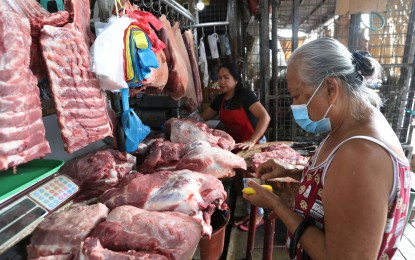
File photo
MANILA – A lawmaker on Wednesday stressed the need for policies that can help bring down commodity prices, particularly food prices, as the inflation in April remained unchanged from the previous month at 4.5 percent.
Marikina City Rep. Stella Quimbo said the main contributor continues to be the inflation for food and non-alcoholic beverages, which made up 40.9 percent of the overall inflation.
Quimbo said meat, particularly pork, had the biggest share of the food and non-alcoholic beverages inflation at 22.1 percent, and fish at 6 percent.
She proposed authorizing the government to directly procure pork meat for purposes of price stabilization in times of emergency, such as the coronavirus pandemic, through House Bill 9256 or the Affordable Pork Act of 2021.
She said the government can provide temporary support and “buy high” from producers and “sell low” to consumers to ensure that prices are fair and competitive by temporarily bringing supply directly to the market.
“At this point, our local production is struggling due to ASF (African swine fever). Hog raisers need to be able to sell at a price that’s reasonably high enough for them to recover costs. At the same time, we need to bring down retail prices for consumers… Naisalba ang local industry, napamura pa ang presyo ng baboy (It will save the local [hog] industry, and help lower the price of pork),” she said.
She, however, noted that government intervention through procurement should only be done on a temporary basis, during this state of emergency.
To improve the resilience of the local pork industry in the longer term, she said the bill also earmarks funds for measures against ASF and to develop the industry’s productive capacity, ensuring that they can withstand competition from cheaper imported meat.
“I call on my colleagues in government to support these measures. Inflation has been averaging a high 4.5 percent from the start of the year to present, but we can very well act swiftly to stabilize commodity prices moving forward,” she said.
Long-run investments
Albay Rep. Joey Salceda, for his part, said long-run investments in biosafety, better feeding, and value-chains are necessary for the domestic pork industry.
Salceda said since these long long-run solutions take time, immediate supply stabilization via a balance of imports and domestic supply management is the key.
“I call on the Department of Agriculture (DA) to help small players, farmer groups, and the domestic swine industry participate in the import market. I support their effort to distribute freezers to small players,” Salceda said.
He said there must also be a mechanism established to allow farmers’ cooperatives to import pork meat by consolidating smaller import orders.
Domestic supply defense, he said, will remain absolutely critical as the rest of the world is also facing ASF.
“At the same time, we must ensure that domestic players, especially backyard hog raisers who account for 70 percent of pork production, are protected from any further outbreaks of the African swine fever,” he said.
He pointed out that individual backyard farming, without the support of cooperatives and farmer associations, would clearly no longer work as it “bears too much risk for too little reward” for the individual farmer.
“It also fails to produce food for us at efficient levels. Agriculture works best in consolidation, with a support ecosystem. I hope to work with the DA so that we can move in this direction,” he said. (PNA)
